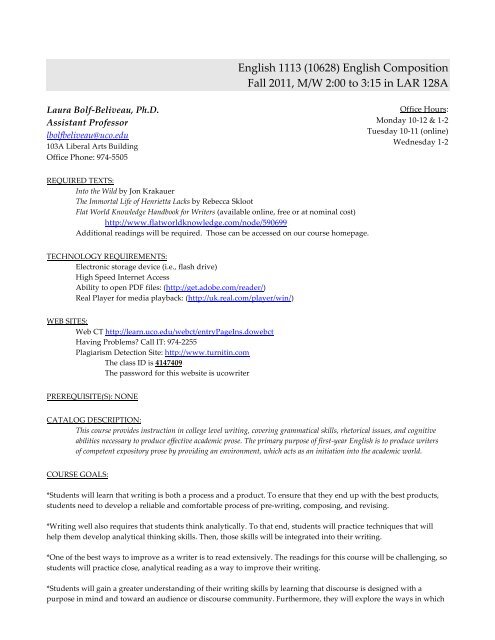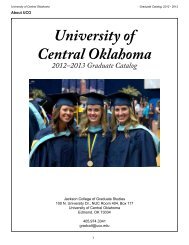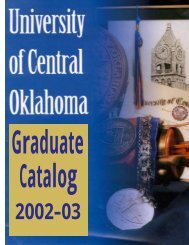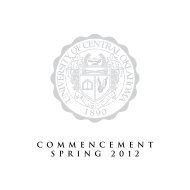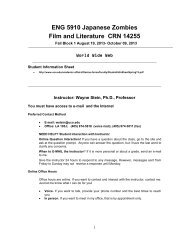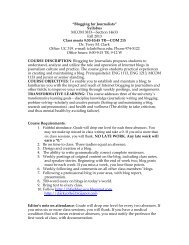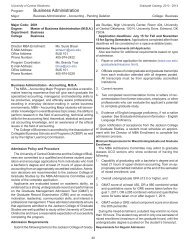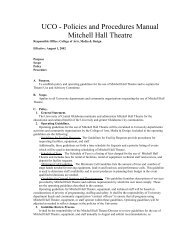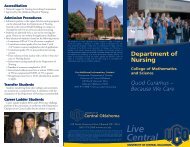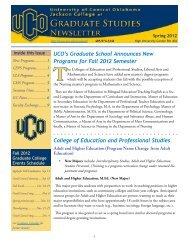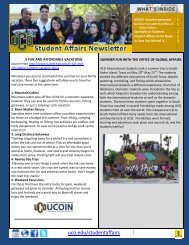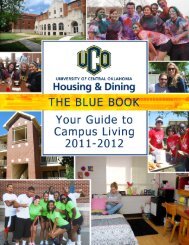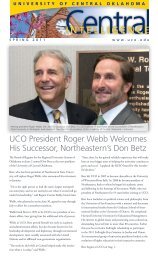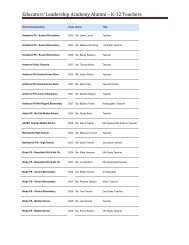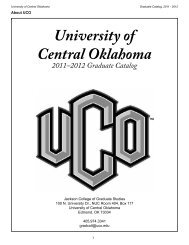ENG 1113, English Composition I - University of Central Oklahoma
ENG 1113, English Composition I - University of Central Oklahoma
ENG 1113, English Composition I - University of Central Oklahoma
Create successful ePaper yourself
Turn your PDF publications into a flip-book with our unique Google optimized e-Paper software.
<strong>English</strong> <strong>1113</strong> (10628) <strong>English</strong> <strong>Composition</strong><br />
Fall 2011, M/W 2:00 to 3:15 in LAR 128A<br />
Laura Bolf-‐‐Beliveau, Ph.D.<br />
Assistant Pr<strong>of</strong>essor<br />
lbolfbeliveau@uco.edu<br />
103A Liberal Arts Building<br />
Office Phone: 974-‐‐5505<br />
Office Hours:<br />
Monday 10-‐‐12 & 1-‐‐2<br />
Tuesday 10-‐‐11 (online)<br />
Wednesday 1-‐‐2<br />
REQUIRED TEXTS:<br />
Into the Wild by Jon Krakauer<br />
The Immortal Life <strong>of</strong> Henrietta Lacks by Rebecca Skloot<br />
Flat World Knowledge Handbook for Writers (available online, free or at nominal cost)<br />
http://www.flatworldknowledge.com/node/590699<br />
Additional readings will be required. Those can be accessed on our course homepage.<br />
TECHNOLOGY REQUIREMENTS:<br />
Electronic storage device (i.e., flash drive)<br />
High Speed Internet Access<br />
Ability to open PDF files: (http://get.adobe.com/reader/)<br />
Real Player for media playback: (http://uk.real.com/player/win/)<br />
WEB SITES:<br />
Web CT http://learn.uco.edu/webct/entryPageIns.dowebct<br />
Having Problems? Call IT: 974-‐‐2255<br />
Plagiarism Detection Site: http://www.turnitin.com<br />
The class ID is 4147409<br />
The password for this website is ucowriter<br />
PREREQUISITE(S): NONE<br />
CATALOG DESCRIPTION:<br />
This course provides instruction in college level writing, covering grammatical skills, rhetorical issues, and cognitive<br />
abilities necessary to produce effective academic prose. The primary purpose <strong>of</strong> first-‐‐year <strong>English</strong> is to produce writers<br />
<strong>of</strong> competent expository prose by providing an environment, which acts as an initiation into the academic world.<br />
COURSE GOALS:<br />
*Students will learn that writing is both a process and a product. To ensure that they end up with the best products,<br />
students need to develop a reliable and comfortable process <strong>of</strong> pre-‐‐writing, composing, and revising.<br />
*Writing well also requires that students think analytically. To that end, students will practice techniques that will<br />
help them develop analytical thinking skills. Then, those skills will be integrated into their writing.<br />
*One <strong>of</strong> the best ways to improve as a writer is to read extensively. The readings for this course will be challenging, so<br />
students will practice close, analytical reading as a way to improve their writing.<br />
*Students will gain a greater understanding <strong>of</strong> their writing skills by learning that discourse is designed with a<br />
purpose in mind and toward an audience or discourse community. Furthermore, they will explore the ways in which<br />
1
the rhetorical situation determines the shape <strong>of</strong> an essay.<br />
*Students will learn the objective use <strong>of</strong> various sources <strong>of</strong> data in analytical essays, with attention to documentation<br />
where appropriate. Students must question the reliability and validity <strong>of</strong> those sources.<br />
*Students will understand how technology influences rhetorical choices and composition skills and how such<br />
advancements operate in the information age.<br />
*Students must master the mechanics <strong>of</strong> punctuation and usage, as well as grammatical and structural analysis that<br />
contributes to effective writing. They will also learn the refinements <strong>of</strong> style and diction.<br />
TRANSFORMATIVE LEARNING OUTCOMES:<br />
Transformative learning is a holistic process that places students at the center <strong>of</strong> their own active and reflective<br />
learning experiences. All students at the <strong>University</strong> <strong>of</strong> <strong>Central</strong> <strong>Oklahoma</strong> will have transformative learning<br />
experiences in six core areas: discipline knowledge; leadership; research; creative and scholarly activities; service<br />
learning and civic engagement; global and cultural competencies; and health and wellness.<br />
This course supports the following tenets <strong>of</strong> transformative learning:<br />
• Discipline Knowledge—students explore, discuss, and practice the techniques, conventions, and processes<br />
that produce college-‐‐level writing.<br />
• Global and Cultural Competency—students read and write analytically about global and cultural issues and<br />
direct writing to divers audiences.<br />
• Problem Solving (Research, Scholarly, and Creative Activities)—students analyze complex texts, produce<br />
creative and scholarly papers and presentations, conduct limited and focused research, and document<br />
sources.<br />
• Health and Wellness—students read about, write about, and discuss those intellectual, emotional, and<br />
spiritual issues that give human existence vitality and meaning.<br />
COURSE ASSIGNMENTS AND GRADING INFORMATION:<br />
Please see Appendix A.<br />
COURSE OUTLINE:<br />
The schedule <strong>of</strong> assignments is available in Appendix B. It will also be distributed in class.<br />
ATTENDANCE POLICY:<br />
Class attendance is mandatory. There is no difference between excused and unexcused absences. Upon the NINTH<br />
absence, you will not earn credit for the course. Excessive tardiness and/or early departures will affect the total number <strong>of</strong><br />
absences.<br />
The pr<strong>of</strong>essor reserves the right to make exceptions based on circumstances beyond the student’s control. Examples<br />
include (but are not limited to) health issues, bereavement leave, military service, etc.<br />
LATE WORK POLICY:<br />
Late work is not accepted. Deadlines for major essays are listed on the course outline, and all students must turn these<br />
assignments in on time. Other assignments like quizzes, group activities, presentations, etc. cannot be made up.<br />
TECHNOLOGY/DECORUM POLICIES:<br />
The use <strong>of</strong> technology during class time is permitted as long as students use this privilege in appropriate ways. Students<br />
are NOT allowed to text or take phone calls during class. Students may use their laptops/iPads/etc. if done so in an<br />
appropriate way. The pr<strong>of</strong>essor reserves the right to ask students to leave the classroom if any behavior is not consistent<br />
with the decorum expected in an academic setting. This will count as an absence.<br />
2
Students will be required to engage in mediated communication. Technological communication (including online<br />
discussions/postings, emails, etc.) should use Standard <strong>English</strong> and be appropriate in tone and intent. Academic<br />
argumentation does NOT include name-calling or belittling one another. Here are some general guidelines to follow:<br />
1. Always identify yourself. When emailing the pr<strong>of</strong>essor or each other, state your full name and indicate in<br />
which class you belong.<br />
2. Use email as a tool for clarification, not a way to state a grievance. If you have a serious issue, use email to<br />
set up a meeting time to talk in person.<br />
3. Respond to emails within 24 hours. The pr<strong>of</strong>essor <strong>of</strong> record will do the same.<br />
4. Do not discuss the class or individuals associated with the class online (including social media). Your<br />
credibility as a member <strong>of</strong> UCO’s academic community could be jeopardized.<br />
5. Report online abuse to the pr<strong>of</strong>essor; do not engage in a discussion that only escalates the situation.<br />
6. Remember that your tone, demeanor, facial expressions, intent, etc. are not easily understood using online<br />
communication. Avoid sarcasm and CAPITALIZING KEY POINTS. The latter can be construed as e-<br />
yelling.<br />
7. Read your contributions (messages/discussion posts/etc.) aloud before sending. Make sure that are easy to<br />
understand and stay on topic.<br />
8. Understand that others may not agree with your beliefs. Academic communities thrive on difference, and<br />
community members should acknowledge another’s point <strong>of</strong> view as part <strong>of</strong> a learning process. The intent <strong>of</strong><br />
this class is not to change what you believe. Instead, find ways to grow intellectually through thoughtprovoking<br />
analysis, synthesis, and evaluation <strong>of</strong> difference.<br />
This list is not comprehensive, and students must be cognizant <strong>of</strong> UCO’s Student Code <strong>of</strong> Conduct. The pr<strong>of</strong>essor <strong>of</strong><br />
record reserves the right to address other issues as they arise during the semester.<br />
PLAGIARISM POLICY:<br />
Plagiarism is a form <strong>of</strong> academic dishonesty in which a student presents the words or ideas <strong>of</strong> another author in a way that<br />
intentionally misleads a reader to believe that the words or ideas were the student’s. Instructors have numerous options for<br />
dealing with confirmed cases <strong>of</strong> plagiarism, ranging from asking students to repeat an assignment to failure <strong>of</strong> the course<br />
and other severe university sanctions. The procedures for dealing with confirmed cases <strong>of</strong> academic dishonesty are located<br />
in the Student Code <strong>of</strong> Conduct, section IV.D.4.<br />
The UCO <strong>English</strong> Department forbids the reuse <strong>of</strong> essays for multiple assignments and classes.<br />
Recently, much has been written about “copy and paste” plagiarism. In essence, this means copying and pasting from the<br />
Internet and claiming thoughts/ideas as your own. Be particularly careful <strong>of</strong> this new type <strong>of</strong> plagiarism. I reserve the right<br />
to require any assignment to be submitted to www.turnitin.com.<br />
TURNITIN.COM POLICY:<br />
UCO subscribes to the Turnitin.com plagiarism prevention service. Students agree that by taking this course, all required<br />
assignments may be subject to submission for textual similarity review to Turnitin.com for the detection <strong>of</strong> plagiarism. All<br />
submitted assignments will be included as source documents in the Turnitin.com restricted access reference database for the<br />
purpose <strong>of</strong> detecting plagiarism <strong>of</strong> such assignments. Use <strong>of</strong> the Turnitin.com service is subject to the Terms and<br />
Conditions <strong>of</strong> Use posted on the Turnitin.com website. Turnitin.com is just one <strong>of</strong> various plagiarism prevention tools and<br />
methods which may be utilized by your faculty instructor during the terms <strong>of</strong> the semesters.<br />
DISABILITY SUPPORT SERVICES STATEMENT:<br />
The <strong>University</strong> <strong>of</strong> <strong>Central</strong> <strong>Oklahoma</strong> complies with Section 504 <strong>of</strong> the Rehabilitation Act <strong>of</strong> 1973 and the American with<br />
Disabilities Act <strong>of</strong> 1990. Students with disabilities who need special accommodations must make their requests by<br />
contacting Disability Support Services, at (405) 974-2516. The DSS Office is located in the Nigh <strong>University</strong> Center, Room<br />
309. Students should also notify the instructor <strong>of</strong> special accommodation needs by the end <strong>of</strong> the first week <strong>of</strong> class.<br />
3
OTHER UCO POLICIES:<br />
You are required to read the UCO Student Information Sheet and Syllabus Attachment. Please refer to the<br />
following URL for more information regarding UCO policies.<br />
http://www.uco.edu/academic-‐‐affairs/files/aa-‐‐forms/faculty/StudentInfoSheet.pdf<br />
Appendix A: Major Assignments<br />
Formal Essays (60% <strong>of</strong> final grade)<br />
Ad Analysis, 2-3 pages, (100 points)<br />
Students will apply the basic principles <strong>of</strong> rhetoric to an public service announcement. Assessment will<br />
focus on prewriting strategies, correctly using MLA formatting, and providing clear, detailed evidence.<br />
Reading Reflection, 3-4 pages, (150 points)<br />
Students will write a first person narrative studying their reading abilities. After course readings for<br />
Into the Wild are finished, students will analyze best practices for bettering college-level reading.<br />
Assessment will focus on the essay’s focus, development, organization, style, and conventions.<br />
Rhetorical Analysis, 4-5 pages, (150 points)<br />
Students will practice third person, academic writing which uses common rhetorical analysis<br />
structures. Strong emphasis will be placed on the “They Say/I Say” model. An additional<br />
element, “What Others Say” will be added to introduce basic research elements. Assessment will focus<br />
on use <strong>of</strong> argument analysis and strength <strong>of</strong> supporting materials. Addition areas may include but are<br />
not limited to MLA formatting, word choice, sentence structure, and use <strong>of</strong> third person point <strong>of</strong> view.<br />
Disciplinary Synthesis, 5-7 pages, (200 points)<br />
While studying The Immortal Life <strong>of</strong> Henrietta Lacks, students will focus on the ways the text<br />
covers a variety <strong>of</strong> academic disciplines. This essay will focus on the interdependency <strong>of</strong> these<br />
areas and will demonstrate the student’s ability to synthesize material from multiple academic<br />
disciplines. Assessment will focus on MLA formatting, focus, development, organization, style, and<br />
conventions.<br />
In-Class/Web CT Activities (20% <strong>of</strong> final grade)<br />
Quizzes, group activities, in-class writings, etc. (200 points)<br />
Students will be required to take quizzes, write informally, and participate in-class activities. The<br />
assessments <strong>of</strong> each will vary, and some <strong>of</strong> these may be completed on Web CT.<br />
Performance/Leadership (20% <strong>of</strong> final grade)<br />
Discussion Contributions (75 points)<br />
Students will be asked to participate in class dialogue in traditional ways (i.e., class discussion, small<br />
group discussion) and on Web CT discussion boards. Assessment will focus on quantity and quality <strong>of</strong><br />
comments/postings.<br />
Group Leader Discussion Assignment (50 points)<br />
A formal group presentation with a technological element will be required. Assessment will include,<br />
but not be limited to, organization, vocal projection, use <strong>of</strong> technology, and equal contribution.<br />
4
Final Exam Presentation (75 points)<br />
Individual presentations will be scheduled for the end <strong>of</strong> the semester. These will be connected to the<br />
Disciplinary Synthesis and will be assessed based on criteria established by the class. Some may be<br />
take place during our scheduled final exam period. Media and design will also be considered<br />
important for the final grade.<br />
Grading Scale Below:<br />
Total Points Possible for Class = 1000<br />
Grading Scale:<br />
1000-900 = A<br />
899-800 = B<br />
799-700 = C<br />
699-600 = D<br />
599-0 = F<br />
5
Appendix B: Schedule <strong>of</strong> Assignments<br />
The pr<strong>of</strong>essor <strong>of</strong> record reserves the right to make alterations as necessary.<br />
FWK = Flat World Knowledge Handbook for Writers<br />
HO = Handout on Web CT<br />
ITW = Into the Wild<br />
HL = The Immortal Life <strong>of</strong> Henrietta Lacks<br />
For this day:<br />
Do this BEFORE class meets:<br />
Wednesday, August 24<br />
*Take Syllabus Quiz on Web CT<br />
*Read FWK, Chapter 1, Section 1 (You are NOT<br />
required to do the exercises.)<br />
*Print/Read/Bring to Class HO, “Words Used in 40<br />
Commencement Speeches”<br />
Monday, August 29 *Read FWK, Chapter 1, Sections 2-4<br />
Wednesday, August 31 *Read FWK, Chapter 4, Sections 1-4<br />
Monday, September 5<br />
No class, Labor Day Holiday<br />
Wednesday, September 7<br />
*Select & watch ad<br />
*Complete prewriting activity for ad analysis<br />
Monday, September 12 *Read FWK, Chapter 5, Sections 1-3 & Section 8<br />
Wednesday, September 14<br />
*Complete entire first draft <strong>of</strong> essay<br />
*Bring in one copy<br />
Monday, September 19<br />
*Upload final draft <strong>of</strong> Ad Analysis to www.turnitin.com<br />
by 2 PM (100 pts.)<br />
*Read FWK, Chapter 2, Sections 2 & 3<br />
Wednesday, September 21 *Read ITW, Chapters 1-5<br />
*Take 1-5 Quiz on Web CT<br />
Monday, September 26 *Read ITW, Chapters 6-8<br />
*Take 6-8 Quiz on Web CT<br />
Wednesday, September 28 *Read ITW, Chapters 9-13<br />
*Take 9-13 Quiz on Web CT<br />
Monday, October 3 *Read ITW, Chapters 14-16<br />
*Write 5 complex questions over 14-16; bring to class<br />
Wednesday, October 5<br />
*Finish ITW<br />
*Discuss Reading Reflection Final Draft<br />
Monday, October 10<br />
*Bring in copy <strong>of</strong> rough draft <strong>of</strong> Reading Reflection<br />
Wednesday, October 12<br />
Monday, October 17<br />
*Upload final draft <strong>of</strong> Reading Reflection to<br />
www.turnitin.com by 2 PM (150 pts.)<br />
*Read FWK, Chapter 6, Sections 1-2<br />
*Print/Read/Annotate HO, “The End <strong>of</strong> Men”<br />
Wednesday, October 19 *Read FWK, Chapter 5, Sections 4-6<br />
*Reread “The End <strong>of</strong> Men”<br />
Monday, October 24<br />
*Read HO, “What in the world is a rhetorical analysis?”<br />
Wednesday, October 26<br />
*Complete rhetorical analysis outline & bring in copy<br />
6
Monday, October 31<br />
*Read FWK, Chapter 8, All Sections<br />
*Draft two paragraphs <strong>of</strong> rhetorical analysis<br />
Wednesday, November 2<br />
*Upload final draft <strong>of</strong> Rhetorical Analysis<br />
www.turnitin.com by 2 PM (150 pts.)<br />
*Read FWK, Chapter 3, Sections 1-3<br />
Monday, November 7 *Read HL, pages 13-48<br />
*Read FWK, Chapter 7, Section 1<br />
Wednesday, November 9 * Read HL, pages 49-86<br />
*Read FWK, Chapter 7, Section 2<br />
Monday, November 14 * Read HL, pages 89-126<br />
* Read FWK, Chapter 7, Section 3<br />
Wednesday, November 16 * Read HL, pages 127-157<br />
* Read FWK, Chapter 7, Section 4<br />
Monday, November 21 * Read HL, pages 158-176<br />
* Read FWK, Chapter 7, Section 5<br />
Wednesday, November 23<br />
No class, Thanksgiving Break<br />
Monday, November 28 *Read HL, pages 179-217<br />
* Read FWK, Chapter 7, Section 6<br />
Wednesday, November 30 *Read HL, pages 218-258<br />
* Read FWK, Chapter 7, Section 7<br />
Monday, December 5 *Read HL, pages 259-304<br />
* Read FWK, Chapter 9, Sections 1 & 2<br />
Wednesday, December 7 * Read HL, pages 304-328<br />
* Read FWK, Chapter 9, Sections 3 & 4<br />
Wednesday, December 14<br />
Final Essay, Disciplinary Synthesis, Due by MIDNIGHT<br />
(200 pts.)<br />
If we need additional time for individual presentations,<br />
we will meet for our final exam scheduled for:<br />
1:00 to 2:50<br />
NOTE: THE START TIME IS DIFFERENT THAN<br />
OUR USUAL TIME.<br />
7


